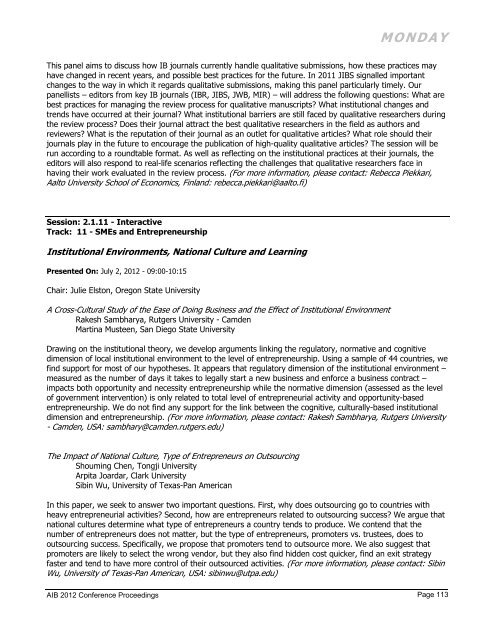AIB 2012 Conference Proceedings - Academy of International ...
AIB 2012 Conference Proceedings - Academy of International ...
AIB 2012 Conference Proceedings - Academy of International ...
Create successful ePaper yourself
Turn your PDF publications into a flip-book with our unique Google optimized e-Paper software.
MONDAY<br />
This panel aims to discuss how IB journals currently handle qualitative submissions, how these practices may<br />
have changed in recent years, and possible best practices for the future. In 2011 JIBS signalled important<br />
changes to the way in which it regards qualitative submissions, making this panel particularly timely. Our<br />
panellists – editors from key IB journals (IBR, JIBS, JWB, MIR) – will address the following questions: What are<br />
best practices for managing the review process for qualitative manuscripts What institutional changes and<br />
trends have occurred at their journal What institutional barriers are still faced by qualitative researchers during<br />
the review process Does their journal attract the best qualitative researchers in the field as authors and<br />
reviewers What is the reputation <strong>of</strong> their journal as an outlet for qualitative articles What role should their<br />
journals play in the future to encourage the publication <strong>of</strong> high-quality qualitative articles The session will be<br />
run according to a roundtable format. As well as reflecting on the institutional practices at their journals, the<br />
editors will also respond to real-life scenarios reflecting the challenges that qualitative researchers face in<br />
having their work evaluated in the review process. (For more information, please contact: Rebecca Piekkari,<br />
Aalto University School <strong>of</strong> Economics, Finland: rebecca.piekkari@aalto.fi)<br />
Session: 2.1.11 - Interactive<br />
Track: 11 - SMEs and Entrepreneurship<br />
Institutional Environments, National Culture and Learning<br />
Presented On: July 2, <strong>2012</strong> - 09:00-10:15<br />
Chair: Julie Elston, Oregon State University<br />
A Cross-Cultural Study <strong>of</strong> the Ease <strong>of</strong> Doing Business and the Effect <strong>of</strong> Institutional Environment<br />
Rakesh Sambharya, Rutgers University - Camden<br />
Martina Musteen, San Diego State University<br />
Drawing on the institutional theory, we develop arguments linking the regulatory, normative and cognitive<br />
dimension <strong>of</strong> local institutional environment to the level <strong>of</strong> entrepreneurship. Using a sample <strong>of</strong> 44 countries, we<br />
find support for most <strong>of</strong> our hypotheses. It appears that regulatory dimension <strong>of</strong> the institutional environment –<br />
measured as the number <strong>of</strong> days it takes to legally start a new business and enforce a business contract –<br />
impacts both opportunity and necessity entrepreneurship while the normative dimension (assessed as the level<br />
<strong>of</strong> government intervention) is only related to total level <strong>of</strong> entrepreneurial activity and opportunity-based<br />
entrepreneurship. We do not find any support for the link between the cognitive, culturally-based institutional<br />
dimension and entrepreneurship. (For more information, please contact: Rakesh Sambharya, Rutgers University<br />
- Camden, USA: sambhary@camden.rutgers.edu)<br />
The Impact <strong>of</strong> National Culture, Type <strong>of</strong> Entrepreneurs on Outsourcing<br />
Shouming Chen, Tongji University<br />
Arpita Joardar, Clark University<br />
Sibin Wu, University <strong>of</strong> Texas-Pan American<br />
In this paper, we seek to answer two important questions. First, why does outsourcing go to countries with<br />
heavy entrepreneurial activities Second, how are entrepreneurs related to outsourcing success We argue that<br />
national cultures determine what type <strong>of</strong> entrepreneurs a country tends to produce. We contend that the<br />
number <strong>of</strong> entrepreneurs does not matter, but the type <strong>of</strong> entrepreneurs, promoters vs. trustees, does to<br />
outsourcing success. Specifically, we propose that promoters tend to outsource more. We also suggest that<br />
promoters are likely to select the wrong vendor, but they also find hidden cost quicker, find an exit strategy<br />
faster and tend to have more control <strong>of</strong> their outsourced activities. (For more information, please contact: Sibin<br />
Wu, University <strong>of</strong> Texas-Pan American, USA: sibinwu@utpa.edu)<br />
<strong>AIB</strong> <strong>2012</strong> <strong>Conference</strong> <strong>Proceedings</strong><br />
Page 113

















